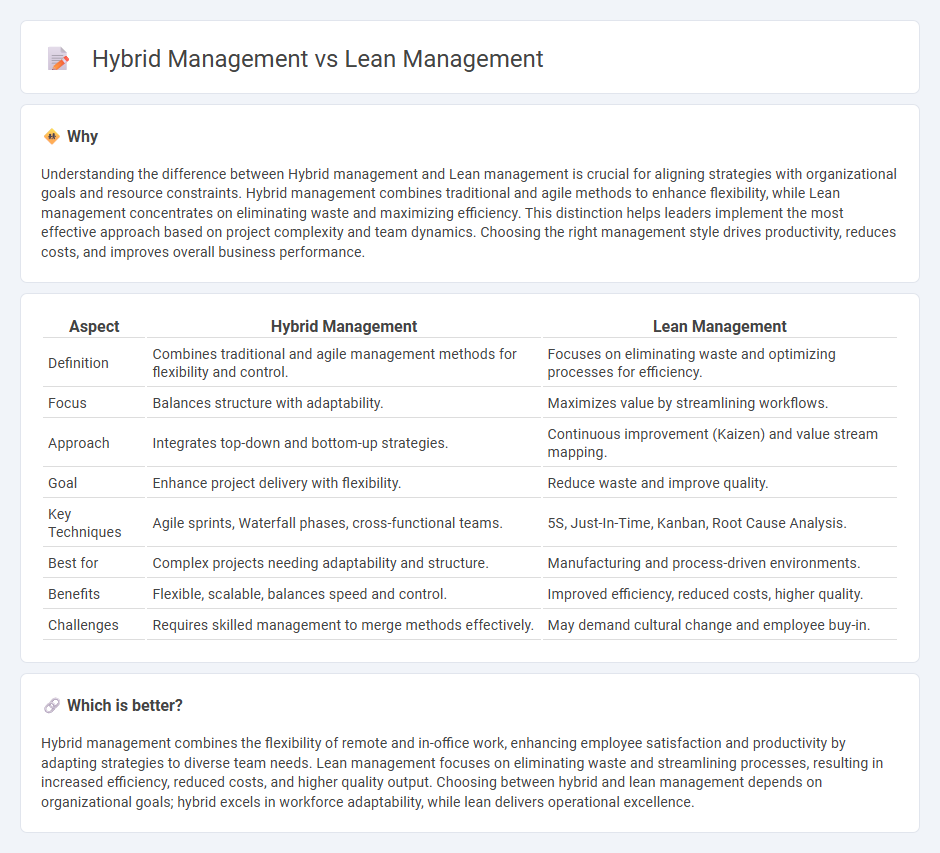
Hybrid management combines traditional hierarchical structures with agile practices to enhance flexibility and efficiency in dynamic business environments. Lean management focuses on minimizing waste and maximizing value by streamlining processes and promoting continuous improvement. Explore the key distinctions and benefits of hybrid and lean management to optimize your organizational strategy.
Why it is important
Understanding the difference between Hybrid management and Lean management is crucial for aligning strategies with organizational goals and resource constraints. Hybrid management combines traditional and agile methods to enhance flexibility, while Lean management concentrates on eliminating waste and maximizing efficiency. This distinction helps leaders implement the most effective approach based on project complexity and team dynamics. Choosing the right management style drives productivity, reduces costs, and improves overall business performance.
Comparison Table
| Aspect | Hybrid Management | Lean Management |
|---|---|---|
| Definition | Combines traditional and agile management methods for flexibility and control. | Focuses on eliminating waste and optimizing processes for efficiency. |
| Focus | Balances structure with adaptability. | Maximizes value by streamlining workflows. |
| Approach | Integrates top-down and bottom-up strategies. | Continuous improvement (Kaizen) and value stream mapping. |
| Goal | Enhance project delivery with flexibility. | Reduce waste and improve quality. |
| Key Techniques | Agile sprints, Waterfall phases, cross-functional teams. | 5S, Just-In-Time, Kanban, Root Cause Analysis. |
| Best for | Complex projects needing adaptability and structure. | Manufacturing and process-driven environments. |
| Benefits | Flexible, scalable, balances speed and control. | Improved efficiency, reduced costs, higher quality. |
| Challenges | Requires skilled management to merge methods effectively. | May demand cultural change and employee buy-in. |
Which is better?
Hybrid management combines the flexibility of remote and in-office work, enhancing employee satisfaction and productivity by adapting strategies to diverse team needs. Lean management focuses on eliminating waste and streamlining processes, resulting in increased efficiency, reduced costs, and higher quality output. Choosing between hybrid and lean management depends on organizational goals; hybrid excels in workforce adaptability, while lean delivers operational excellence.
Connection
Hybrid management combines traditional and agile methodologies to enhance flexibility and efficiency, integrating elements of Lean management that focus on waste reduction and continuous improvement. Lean management principles support hybrid approaches by streamlining processes and promoting value-driven decision-making within diverse project environments. This connection enables organizations to optimize resource use while maintaining adaptability and responsiveness to change.
Key Terms
Lean management:
Lean management emphasizes eliminating waste, improving process efficiency, and delivering maximum value to customers by continuously optimizing workflows and reducing non-value-added activities. It relies on tools such as value stream mapping, 5S, and Kaizen to foster a culture of continuous improvement and employee empowerment within organizations. Explore further to understand how Lean management methodologies can transform operational performance and drive sustainable growth.
Waste reduction
Lean management emphasizes continuous waste reduction by streamlining processes, minimizing inventory, and eliminating non-value-added activities to enhance operational efficiency. Hybrid management combines lean principles with agile methodologies, allowing flexibility in waste reduction strategies while adapting to changing business environments. Explore how integrating lean and hybrid approaches can maximize waste reduction and improve organizational performance.
Continuous improvement (Kaizen)
Lean management emphasizes continuous improvement through Kaizen by eliminating waste and optimizing processes to enhance value for customers. Hybrid management integrates Lean principles with agile and traditional approaches, fostering adaptability while maintaining a continuous improvement mindset. Discover how combining these methodologies can drive sustainable organizational growth.
Source and External Links
What is Lean Management? | Definition from TechTarget - Lean management is a long-term approach focused on continuous improvement to eliminate waste and optimize processes by delivering value based on real customer demands, founded on principles from the Toyota production system.
Definition, tools and advantages of Lean Management - Lean Management improves company performance by creating smooth workflows, producing work only on demand, and involving employees at all levels in continuous process improvement.
What is a Lean Management System? - Lean Enterprise Academy - Lean management systems empower line managers and all employees to take responsibility for both daily work and continuous improvement, supported by clear processes, KPIs, visualization, and problem management routines.
 dowidth.com
dowidth.com